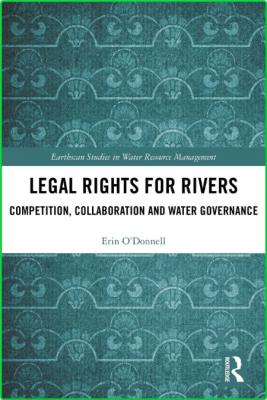 Legal Rights for Rivers - Competition, Collaboration and Water Governance
Legal Rights for Rivers - Competition, Collaboration and Water Governance
Miér Ago 18, 2021 12:16 pm

[/center]
Legal Rights for Rivers - Competition, Collaboration and Water Governance
pdf | 2.66 MB | English | Isbn: B07JHD2RLD | Author: Erin O'Donnell | Year: 2018
[/center]
Description:
In 2017, four rivers were given the status of legal persons, in New Zealand, India and Colombia, and there was a recent attempt to extend these rights to the Colorado River in the USA. Understanding the implications of creating legal rights for rivers is an urgent challenge for both water resource management and environmental law. Giving rivers legal rights means the law can see rivers as legal persons, thus creating new legal rights that can then be enforced. When rivers are legally people, does that encourage collaboration and partnership between humans and rivers, or establish rivers as another competitor for scarce resources?
To assess what it means to give rivers legal rights and legal personality, this book examines the form and function of environmental water managers (EWMs). These organizations have legal personality, and have been active in water resource management for over two decades. EWMs operate by acquiring water rights from irrigators in rivers where there is insufficient water to maintain ecological health. EWMs can compete with farmers for access to water, but they can also strengthen collaboration between traditionally divergent users of the aquatic environment, such as environmentalists, recreational fishers, hunters, farmers, and hydropower. This book explores how EWMs demonstrate the opportunities created by giving nature legal rights, such as the ability to participate in markets, enter contracts, hold property, and enforce those rights in court. However, examination of the EWMs unearths a crucial and unexpected paradox: giving legal rights to nature may increase its legal power, but in doing so, it can weaken community support for protecting the environment at all. The book develops a new conceptual framework to identify the multiple constructions of the environment in law, and how these constructions can interact to generate these unexpected outcomes. It explores EWMs in the USA and Australia as examples, and assesses the implications of creating legal rights for rivers for water governance. Lessons from the EWMs, as well as early lessons from the new 'river persons' show how to use the law to improve river protection, and how to begin to mitigate the problems of the paradox.
Category:Property Law, Environmental & Natural Resources Law, Property Law
Hosters: Rapidgator |Nitroflare
https://rapidgator.net/file/8a1594d2db15e29d43abad91572e8666/f82v62z2p2mk.rar
[/center]
https://nitro.download/view/FAE5B3082A53DA7/0sf16l3g7m7g.rar
- Committed to Rights - Volume 1 - UN Human Rights Treaties and Legal Paths for Com...
- Co-produced Economies - Capital, Collaboration, Competition
- Fundamental Rights and the Legal Obligations of Business
- Defending Privilege - Rights, Status, and Legal Peril in the British Novel
- Legal Rights - The Guide For Deaf And Hard Of Hearing People
Permisos de este foro:
No puedes responder a temas en este foro.


